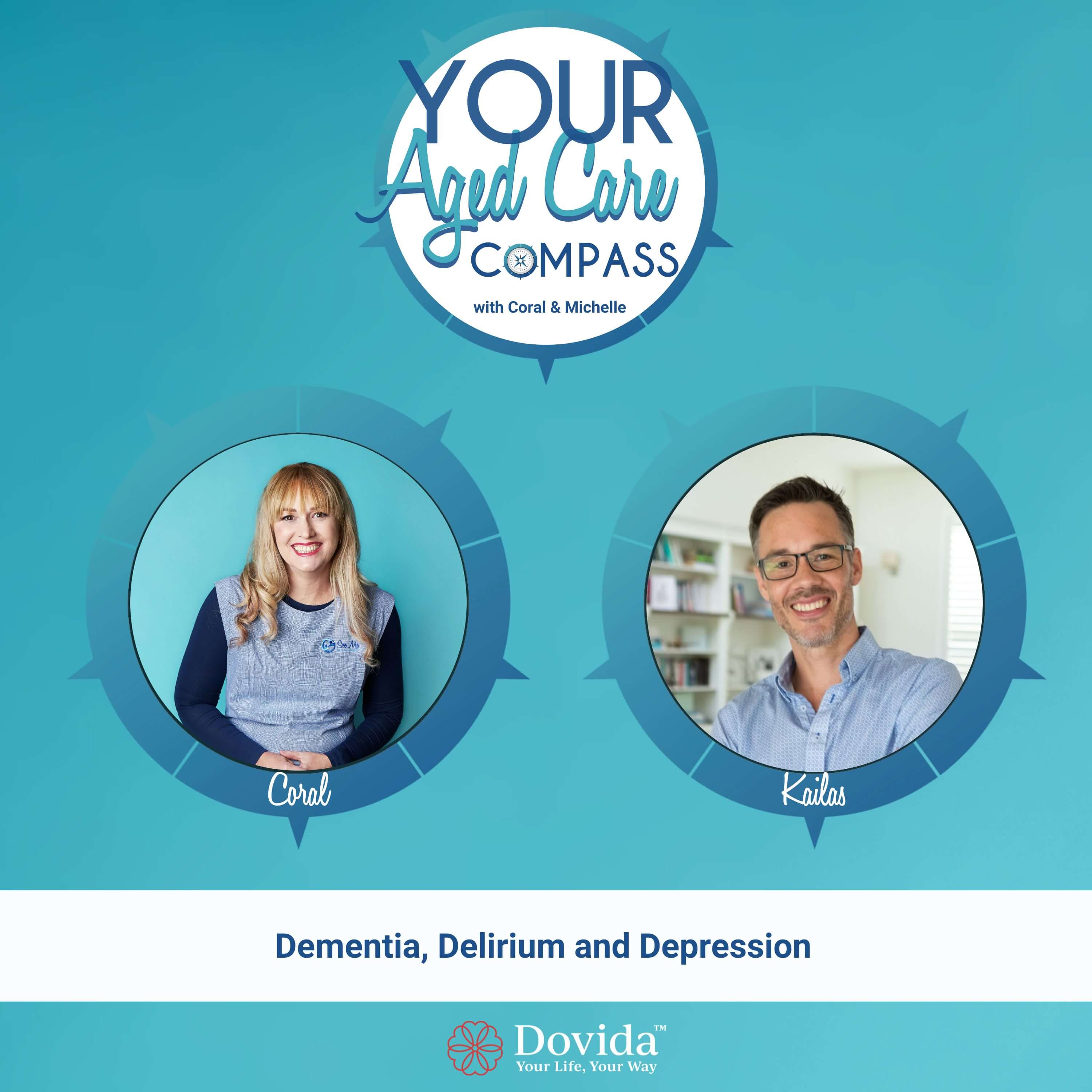Episode Description
In this episode of Your Aged Care Compass, Coral is joined by psychiatrist Dr Kailas Roberts to discuss three often-confused conditions that affect older adults: dementia, delirium and depression. These conditions can present with overlapping symptoms, such as memory loss, confusion, and mood changes, but their causes, trajectories, and treatments differ significantly. Understanding these nuances is critical for families, carers, and professionals supporting older people through health transitions.
Dr Roberts brings decades of clinical experience and a deep commitment to brain health to this conversation. He explains how each condition manifests, how they can coexist, and why accurate diagnosis is essential, especially when symptoms fluctuate or appear suddenly. Coral also shares personal reflections from her father's experiences with delirium during hospital stays, adding warmth and real-world context to the discussion.
In this episode:
- Dementia is a clinical syndrome caused by various diseases, including Alzheimer’s, vascular dementia, and Lewy body dementia
- Delirium is an acute confusional state that can be reversed if the underlying cause is treated
- Depression is a mood disorder that can mimic dementia symptoms, especially in older adults
- Cognitive symptoms such as memory loss and attention difficulties can appear in all three conditions
- “Depressive pseudodementia” refers to cognitive impairment caused by depression rather than neurodegeneration
- Sudden changes in cognition or behaviour often point to delirium rather than dementia
- Delirium symptoms fluctuate throughout the day, while dementia tends to be more stable
- Depression symptoms may be worse in the morning, unlike dementia, which often worsens later in the day
- A thorough history of the patient is essential to distinguish between these conditions
- Medication changes, infections, and electrolyte imbalances are common triggers for delirium
- Hypoactive delirium, marked by withdrawal and quietness, is often missed but just as serious as hyperactive forms
- Non-drug interventions like reorientation cues and good lighting are key to managing delirium
- Antidepressants can be helpful in depression but should be considered alongside lifestyle and psychological therapies
- Carers are often the first to notice changes. Trusting and acting on their observations can lead to earlier diagnosis and better outcomes.
Resources mentioned:
- Book – Mind Your Brain; The Essential Australian Guide to Dementia
Connect with Dr Kailas Roberts:
Connect with Coral Wilkinson:
Follow See Me Aged Care Navigators:
More about Your Aged Care Compass podcast:
Do you support an older loved one at home and you're ready to give up because it’s just too hard? Your Aged Care Compass is for you.
We're Coral and Michelle, the sisters behind our business, See Me Aged Care Navigators.
Coral is a registered nurse with over 30 years’ experience in both health and aged care. A former assessor with the aged care assessment team, an advocate and author, there’s not much Coral doesn’t know about Australia’s aged care system.
Michelle is a former pharmacist with over 30 years in the public health and private sectors of pharmacy. Michelle is the client care manager for our business.
Our story started as one of supporting our parents to remain in their own home, to be as independent as possible and remain connected to their community. When we eventually needed extra support, we achieved this because we know Australia’s aged care system so well. We knew what programs could assist us and our parents.
Your Aged Care Compass podcast brings together not only our personal experience in supporting our parents but also our vast professional experience in supporting other families to keep their loved ones at home.
We'll help you makes sense of Australia’s aged care system and bring you topics related to ageing as well. Legal, financial, health, forward planning and more.
Your Aged Care Compass will guide you clearly and compassionately to the right support at the right time for your ageing parents and loved ones.
Like what you hear? Please leave us a rating and review. We’d love you to share this podcast with any friends or family who have older loved ones.
Mentioned in this episode:
Let's Talk Consultation
Book a one-hour personalised consultation where you get to ask us any questions relating to your or your loved one's situation.
